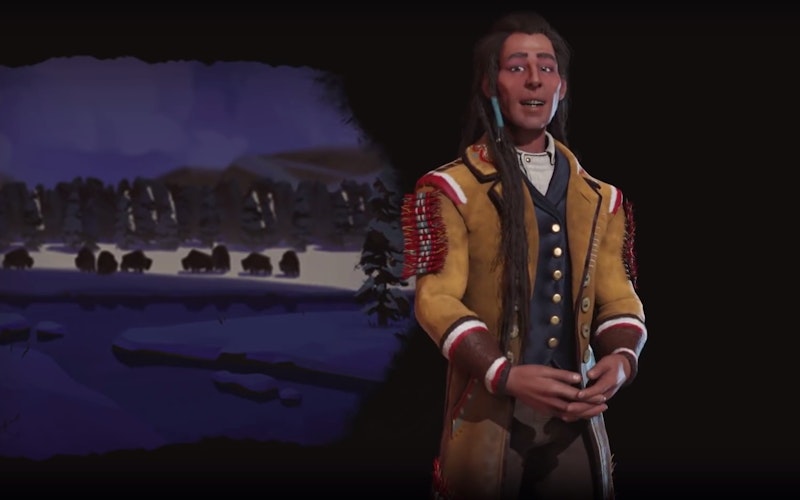
Games
Why the Cree Don’t Fit Civilization VI
A video game made headlines in Canada last week, although not, perhaps, in the way you might expect. There was no uproar over Grand Theft Auto-style beatings and killings. Instead, an expansion of the globally successful Sid Meier’s Civilization VI, Civilization VI: Rise and Fall, is coming out in February, and one of the new civilizations is the Cree, an aboriginal people in Canada.
So what could be so controversial? The answer is a bit complicated, but worth working through, as it not only gets to the heart of the challenge of making video games, but also speaks to how, as Christians, we can fully respect the diversity of God’s children.
As a strategy gamer, I’m a huge fan of the Civilization series, the first version of which came out in 1991. All versions of the game put the player in control of a culture as it builds from technologically primitive beginnings to some form of global dominance. Gameplay involves harvesting resources, constructing key civic buildings, producing military and engineering units, and spreading across a map to increase the size of the growing civilization. In the latest versions of the game, a player can win by achieving technological supremacy, converting other civilizations to a particular religion, conquering other civilizations, or achieving the greatest levels of cultural achievements. The game is a complicated simulation of history that rewards careful planning and good decision-making.
At the beginning of the game, the player adopts a particular culture. You can take over the world as the French, the Chinese, the Indians, the Spanish, the Brazilians, and so on. Apparently, Civilization VI: Rise and Fall will add the Cree to the list of options.
On the surface, this looks like a fairly positive thing. Native American cultures (we use the term “First Nations” in Canada) are sadly underrepresented in video games. The advance release of the artwork and music for Rise and Fall looks and sounds beautiful, and the game’s website gives a fairly in-depth history of Chief Poundmaker, who attempted to bring peace between his people and the Canadian government in the late 1800s, only to be imprisoned and to die shortly after his release. So, why have contemporary representatives of the Cree complained?
Well, the problem is that a game is not just a collection of images and sounds. It is not just a movie or television show, no matter how much it looks like one. Instead, whatever else it might be, a game is always, at the very least, a system of rules that a player interacts with. It’s like a machine, like a microwave oven or automobile: when we push a button, something reacts and changes. But of course, it’s a meaningful machine. Everything we do in a game has a meaning that we can explain.
And for all its visual attractiveness and thoughtful background text, Rise and Fall seemingly presents the Cree people acting in a way that is fundamentally out of tune with their cultural values. The way the game machine works, in other words, is out of tune with the culture it is visually representing. At base, all versions of Civilization are games about imperial conquest or colonization. Fans of this genre call them 4X games: explore, expand, exploit, and exterminate. Even an apparently peaceful victory condition, like the so-called culture win, requires players to out-accumulate and dominate their competitors.
The way the game works is out of tune with the culture it is representing.
Territorial, technological, financial, and cultural acquisition and accumulation are values fundamentally at odds with most First Nations cultures, and that’s certainly true of the Cree. Even if that wasn’t true, the Cree (and every other First Nations group in the Americas) have suffered deeply from exactly those values. The colonization of the so-called New World involved the displacement or extermination of aboriginal people, the destruction of their means of survival, and frequently the elimination or gutting of their culture.
To put the Cree in the role of the colonizer, the imperial oppressor, is deeply problematic. Essentially, what the game has done is taken western cultural values and practices and dressed them up as a First Nations group. This is akin to blackface, the offensive practice of white people wearing black makeup and playing out incredibly harmful and racist stereotypes about African-Americans.
For Christians, the injustice of this sort of representation should be fairly clear. The New Testament insists that all people are God’s children, and that any kind of cultural hierarchy between groups should disappear. As Paul wrote to the Colossians, “Here there is no Gentile or Jew, circumcised or uncircumcised, barbarian, Scythian, slave or free, but Christ is all, and is in all.”
What this does not mean is that all Christians should be the same in all regards. The mistake of the western Church over the last couple centuries of empire-building was to assume that Christian culture was European culture. Putting the Cree in the role of a colonial power continues that terrible trend. Never mind the awful ethics of conquest and assimilation: denying the diversity of culture is, from a biblical perspective, a serious problem.
I also think, however, that we need to approach issues like these with a certain degree of humility. Handling representation in today’s global media context is a tricky thing, and that’s complicated by the fact that—even decades after the arrival of the video-game medium—we’re still learning how games communicate. I rather suspect that Firaxis, Civilization’s development company, thought it was doing something positive with its representation of the Cree.
But we can do better. We can respect and promote the diversity of culture that God delights in—via imagery and sound, yes, but also by offering a diversity of game mechanics. We need to design games that show there is more than one way to be human, even as we acknowledge that we are all loved by God and created in his image.
Topics: Games